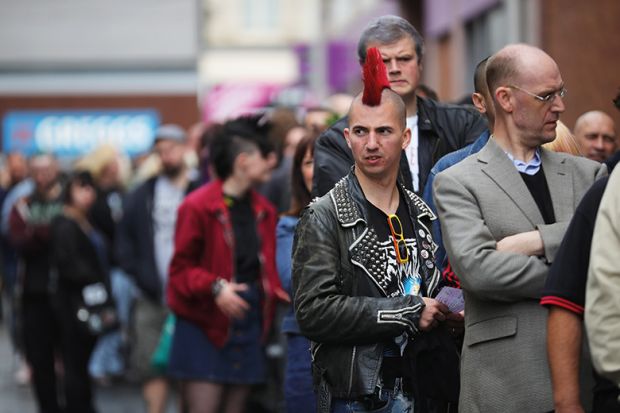“I was told I was thick at school and I left with very few qualifications,” said Mike Dines, an independent cultural studies scholar. “But punk pushed me into areas of reading about anarchy and subversion, squatting, alternative cultures…which I was fascinated by. If it wasn’t for punk I wouldn’t have got my degree, my master’s, my PhD.”
Dr Dines was the first in his family to go to university. Having secured a place at the West Sussex Institute of Higher Education (now the University of Chichester) for his piano playing, he began to appreciate what punk could bring to academia. He went on to do a PhD and co-found the Punk Scholars Network, which is associated with a journal, Punk & Post Punk.
People may wonder what punks are doing in academia, given the anti-institutional attitude of the subculture. However, punk scholars are widespread in the arts, humanities and social sciences, tending to share disruptive, liberal values while refusing to fit into one mould.
“I’m from the first generation of punks in the UK who [were] attracted by the idea that there are no rules and no core philosophy. As soon as a set of rules would come into place, punk tended to do the opposite,” said Russell Bestley, a lecturer in graphic design at the University of the Arts London. He said that punk scholars can find themselves – to echo the title of a post-punk track from 1978 – “shot by both sides”: by other punks who suspect them of selling out, and by academics who “tend to look down their noses” at punk scholarship.
This conflict between maintaining a punk identity and playing a part in an institution of formal education appears to be at the heart of being a punk academic.
“Having a degree is the main value proposition of undertaking a university education, and that’s essentially credentialist. [So] there is something inherently contradictory about being a punk and working in higher education,” said Tom Parkinson, a lecturer in higher education and academic practice at the University of Kent, whose recent paper “Being punk in higher education” explores the conflict through interviews with punk academics who have found strategies to deal with these contradictions.
One interviewee in the paper explains how he has tried to “reclaim” academia as a space for punks. Others describe higher education as a weapon for social justice rather than for training the elite. All have found ways to incorporate their punk values into their academic practice, particularly in teaching. For instance, one academic quoted in the paper says he advises his students that there’s no need to write in detail “about theories and methodologies and so on, that’s boring”. Another encouraged his students to think critically, saying bluntly: “Don’t listen to what anyone else is saying – it’s rubbish”.
An example of a punk approach to teaching can be found at Middlesex University, where Marcus O’Dair, senior lecturer in popular music, and Zuleika Beavan, senior lecturer in arts management, have challenged their students to raise money for a music release using the digital currency Bitcoin. The DIY aspect of the project, combined with the absence of established rules regarding Bitcoin, led them to frame it as punk. “There seems to be a lot of potential [for] disruption [with a system like Bitcoin], so it feels like an exciting space to be in,” Mr O’Dair said.
An injection of disruption may liven up an otherwise stale undergraduate course, and Dr Dines said that punk academics are “very lucky” to have the liberty to say and do what they want in their academic settings. He is concerned, however, that closer monitoring of academics via the research excellence framework and teaching excellence framework will encroach on their freedom.
Dr Dines’ view is shared by other punk academics featured in Dr Parkinson’s study, who describe having to compromise their values and aesthetics, especially in order to get students through their exams or for the academics themselves to secure their next post. “[The punk academics] felt their impulse to be disruptive or to go against the grain is chastened to an extent there,” said Dr Parkinson.
Critics may wonder whether punk that is watered down in this way can be regarded as punk at all. This is, after all, a subculture that thrives on outrage. In its more moderated form, punk scholarship becomes primarily about framing critical, exploratory thinking through the lens of punk. But then is such an approach just the same as other forms of critical scholarship?
“It’s certainly not the case that [critical thinking] can be found in punk and punk alone…these are all well-rehearsed ideas,” acknowledged Dr Parkinson. “But it presents a new way of looking at it.”
According to Dr Parkinson, the incorporation of punk into teaching and research belongs to a disparate set of movements where subculture meets scholarship: these can range from discussion about the academisation of hip hop to “gonzo pedagogies”, which aim to counteract the “staleness” of teaching using exaggeration, humour and anecdote. Like punk scholarship, approaches such as these have emerged as subcultures “come of age” and their members enter academia.
As punk and other subcultures develop and embrace new ideas, there are also discussions about how new trends should be incorporated with academia.
“In my observation there’s a fairly broad generational divide or generational span of scholars. A small number are the first-generation punks, but there are a lot of younger scholars now who are associating with a more contemporary punk scene [that is] affected by identity politics; it’s not so much fashion- and music-led as the original movement,” said Dr Bestley.
Although a younger, more coherently progressive subset of punks championing social justice may be entering academia and reshaping what it means to be a punk academic, the very impossibility of pinning down what punk stands for makes it “susceptible to co-optisation”, including by mainstream society. Paradoxically, could political movements such as the so-called alt-right, who inveigh against the authority of academics, even be associated with punk?
“Punk with its stripped-back simplicity is almost privileging action over expertise. It was anti-credentialist in a way. In the context of the anti-expert theme in politics at the moment, I wonder how those two things relate to each other,” Dr Parkinson said.
“A lot of punks, I imagine, would be very keen to distance themselves from that political movement.”
Register to continue
Why register?
- Registration is free and only takes a moment
- Once registered, you can read 3 articles a month
- Sign up for our newsletter
Subscribe
Or subscribe for unlimited access to:
- Unlimited access to news, views, insights & reviews
- Digital editions
- Digital access to THE’s university and college rankings analysis
Already registered or a current subscriber?




